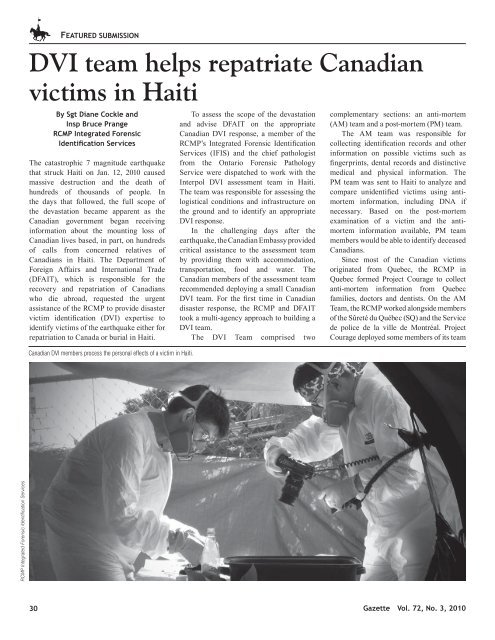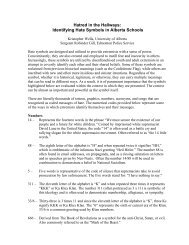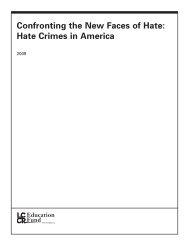FEATuRED SubMiSSiONDVI team helps repatriate Canadianvictims in Haitiby Sgt Diane Cockle <strong>and</strong>insp bruce Prange<strong>RCMP</strong> integrated Forensicidentification ServicesThe catastrophic 7 magnitude earthquakethat struck Haiti on Jan. 12, 2010 causedmassive destruction <strong>and</strong> the death ofhundreds of thous<strong>and</strong>s of people. Inthe days that followed, the full scope ofthe devastation became apparent as theCanadian government began receivinginformation about the mounting loss ofCanadian lives based, in part, on hundredsof calls from concerned relatives ofCanadians in Haiti. The Department ofForeign Affairs <strong>and</strong> International Trade(DFAIT), which is responsible for therecovery <strong>and</strong> repatriation of Canadianswho die abroad, requested the urgentassistance of the <strong>RCMP</strong> to provide disastervictim identification (DVI) expertise toidentify victims of the earthquake either forrepatriation to Canada or burial in Haiti.Canadian DVI members process the personal effects of a victim in Haiti.To assess the scope of the devastation<strong>and</strong> advise DFAIT on the appropriateCanadian DVI response, a member of the<strong>RCMP</strong>’s Integrated Forensic IdentificationServices (IFIS) <strong>and</strong> the chief pathologistfrom the Ontario Forensic PathologyService were dispatched to work with theInterpol DVI assessment team in Haiti.The team was responsible for assessing thelogistical conditions <strong>and</strong> infrastructure onthe ground <strong>and</strong> to identify an appropriateDVI response.In the challenging days after theearthquake, the Canadian Embassy providedcritical assistance to the assessment teamby providing them with accommodation,transportation, food <strong>and</strong> water. TheCanadian members of the assessment teamrecommended deploying a small CanadianDVI team. For the first time in Canadi<strong>and</strong>isaster response, the <strong>RCMP</strong> <strong>and</strong> DFAITtook a multi-agency approach to building aDVI team.The DVI Team comprised twocomplementary sections: an anti-mortem(AM) team <strong>and</strong> a post-mortem (PM) team.The AM team was responsible forcollecting identification records <strong>and</strong> otherinformation on possible victims such asfingerprints, dental records <strong>and</strong> distinctivemedical <strong>and</strong> physical information. ThePM team was sent to Haiti to analyze <strong>and</strong>compare unidentified victims using antimorteminformation, including DNA ifnecessary. Based on the post-mortemexamination of a victim <strong>and</strong> the antimorteminformation available, PM teammembers would be able to identify deceasedCanadians.Since most of the Canadian victimsoriginated from Quebec, the <strong>RCMP</strong> inQuebec formed Project Courage to collectanti-mortem information from Quebecfamilies, doctors <strong>and</strong> dentists. On the AMTeam, the <strong>RCMP</strong> worked alongside membersof the Sûreté du Québec (SQ) <strong>and</strong> the Servicede police de la ville de Montréal. ProjectCourage deployed some members of its team<strong>RCMP</strong> Integrated Forensic Identification Services30<strong>Gazette</strong> Vol. 72, No. 3, 2010
FEATuRED SubMiSSiONto Haiti to gather anti-mortem informationfrom family members who were travelling inHaiti or living there with the victims whenthe earthquake hit.Three six-member PM teams werealso deployed to Haiti. Each consisted ofa forensic pathologist, an odontologist,<strong>and</strong> four forensic identification/fingerprintspecialists from the <strong>RCMP</strong> as well as fromthe Hamilton Police Service, Ottawa PoliceService or the SQ. Some of the forensicidentification members had recently receivedDVI training in Ottawa at the CanadianPolice College Post Disaster Course.In addition, the chief forensicpathologist’s office in Toronto co-ordinatedseveral provincial forensic pathologistsfrom Ontario <strong>and</strong> <strong>Alberta</strong> who volunteeredtheir services in Haiti. The CanadianForces Dental Unit supplied forensicodontologists, who also helped establishdirect communication with the CanadianForces base to facilitate logistical supportsuch as equipment, fuel, food <strong>and</strong> water.The first PM team left Trenton airbaseon board a military C-17 <strong>and</strong> arrived inPort-au-Prince on Feb. 1, 2010. At theend of the Port-au-Prince airport runway,a field morgue was set up next to a largerefrigeration unit where Canadian victimswere stored. The field morgue consistedof two Canadian Forces tents pitched endto end to allow air circulation. Electricgenerators supplied electricity for dentalx-rays, laptops <strong>and</strong> autopsy tools. Each PMteam that was deployed spent approximatelytwo weeks in Haiti.The AM team worked closely withthe PM team to supply as much antimorteminformation as possible aboutmissing individuals before autopsies wereperformed. Based on comparisons betweenAM <strong>and</strong> PM information, which includedfingerprints <strong>and</strong> dental records, PM teamsdiligently completed positive identificationsso that death certificates could be issued<strong>and</strong> victims could be returned to Canada onthe next available flight or buried locally inHaiti as per the families’ wishes.The success of the PM team’s positiveidentifications was due largely to the quantity<strong>and</strong> quality of anti-mortem information thatmembers of Project Courage obtained. Whenfingerprints <strong>and</strong> dental data were insufficientfor identification, PMteam members wouldextract a bone sample<strong>and</strong> send it for cryogenicgrinding at a privatelaboratory in Canada.The processed bone orteeth was subsequentlysent to <strong>RCMP</strong>Forensic Science <strong>and</strong>Identification ServicesLaboratories for DNAprofiling <strong>and</strong> comparisonto anti-mortem DNAsamples.Similar to the DVIresponse in Thail<strong>and</strong> after the Asian tsunami,the heat <strong>and</strong> lack of water provided some ofthe most extreme challenges for the team inHaiti. In Haiti, the DVI team depended on theCanadian Forces <strong>and</strong> the Canadian Embassyto provide support to operate <strong>and</strong> managethe morgue. All of the critical equipmentwas brought in <strong>and</strong> resupplied from Canadausing military transport. Since the morguewas set up on the airfield, the team was ableto access supplies in a very short time period.ChallengesThe teams working inside the morguewere subjected to temperatures as high as45 degrees Celsius due to the humidity ofthe environment, the use of dark canvastents, <strong>and</strong> the lack of air-conditioning orfans. Each member of the team worked insteel-toed <strong>and</strong> shanked rubber boots, fullbodyprotection suits, full-length plasticaprons, goggles <strong>and</strong> half-masked charcoalfilter respirators to provide relief from postmortem odours.Within 10 minutes of suiting up,members would quickly find themselvessoaked with perspiration. The team alsohad to contend with indigenous insectssuch as tarantulas, black widow spiders <strong>and</strong>millipedes, which sometimes found theirway into the morgue site.To overcome these challenges memberstook compulsory water breaks every 30minutes with electrolyte replacementpowders added to every second bottleof water. They used cooling vests,which contained gel panels that werefrozen each night, to keep core bodyAn identified Canadian victim is returned to Canada.temperature low until midday.The Canadian Forces supplied teammembers with ready-to-eat meals, whichwere eaten in the uncontaminated portionof the field morgue.PurposeThe main focus of the Canadian DVIteam was to bring closure to families whosuspected their loved ones may have beenvictims of the earthquake. Oftentimes,families require confirmation that a lovedone is deceased so that they can take care ofthe remains <strong>and</strong> begin the grieving process,bringing to an end weeks of anxious waiting<strong>and</strong> uncertainty.By early spring, the AM <strong>and</strong> PM teamsin Haiti <strong>and</strong> Canada had examined 27victims <strong>and</strong> soon after positively identified22 individuals. The remaining five victimswere not Canadian, <strong>and</strong> were turned over toHaitian authorities.Every disaster is unique whether athome or abroad. With the experience gainedfrom this deployment <strong>and</strong> further training todevelop <strong>and</strong> hone expertise in DVI, Canadawill continue to provide quality service tothe families of loved ones <strong>and</strong> the Canadiangovernment.The success of Canada’s quick <strong>and</strong>efficient DVI response to the Haitianearthquake would not have been possiblewithout the contributions <strong>and</strong> co-operationof DFAIT, the Canadian Forces, theforensic odontology community, provincialcoroners, medical examiners <strong>and</strong> forensicpathologists, <strong>and</strong> the various police agenciesworking in Canada <strong>and</strong> in Haiti. ▪<strong>RCMP</strong> Integrated Forensic Identification Services<strong>Gazette</strong> Vol. 72, No. 3, 2010 31







